Issue Archive
Table of Contents
BLOOD COMMENTARIES
REVIEW ARTICLE
Hemocompatibility and biophysical interface of left ventricular assist devices and total artificial hearts
Mechanical circulatory support (MCS) with either left ventricular assistance devices or artificial hearts is increasingly utilized in treating cardiac failure, but chronic exposure of blood to nonphysiological surfaces has consequences for hemostasis. Nascimbene and coauthors provide a contemporary review of the state of vascular biology and clinically relevant outcomes with long-term MCS. As the use of MCS becomes more prevalent, hematologists will need to become more aware of its particular clinical challenges, and further advances in design are needed to reduce hemostatic complications.
CLINICAL TRIALS AND OBSERVATIONS
CAR T cells and time-limited ibrutinib as treatment for relapsed/refractory mantle cell lymphoma: the phase 2 TARMAC study
Clinical Trials & Observations
It is hoped that outcomes for chimeric antigen receptor (CAR) T-cell therapy can be improved through a combination with established drugs. Minson and colleagues present the first clinical study combining a Bruton tyrosine kinase inhibitor with CD19 CAR T cells in relapsed/refractory mantle cell lymphoma (MCL), reporting an 80% complete response rate and elimination of measurable residual disease in 14 of 20 patients. Toxicity was similar to that with CAR T-cell therapy alone, warranting future randomized trials to assess similar regimens for poor prognosis MCL.
LYMPHOID NEOPLASIA
Sequential antigen loss and branching evolution in lymphoma after CD19- and CD20-targeted T-cell–redirecting therapy
Duell et al traced aggressive and indolent B-cell lymphomas as the tumors escaped elimination by T-cell–redirecting immunotherapy in patients. The authors showed that truncating mutations in MS4A1 with subsequent CD20 antigen loss are a major mechanism of resistance to CD3×CD20 bispecific antibodies. However, there was considerable spatial and temporal heterogeneity in target antigen expression during relapses, including reemergence of CD20 expressing clones. These data indicate complex branching evolutionary trajectories under the selection pressure of serial immunotherapy.
MYELOID NEOPLASIA
Transcriptional control of leukemogenesis by the chromatin reader SGF29
Many acute myeloid leukemias (AMLs) with a very poor prognosis have upregulated expression of homeobox genes that must be reversed if a cure is to be achieved. Barbosa et al used pharmacological and genetic screens to discover that the chromatin reader protein SGF29 is an exciting target, with compelling cell line and patient-derived xenograft data showing knockout of this gene suppresses leukemia and dependency mapping, suggesting that this may be selective. The authors’ findings will likely stimulate development of small molecule inhibitors of this new target.
RED CELLS, IRON, AND ERYTHROPOIESIS
Safety, tolerability, and activity of the active C1s antibody riliprubart in cold agglutinin disease: a phase 1b study
Clinical Trials & Observations
In this phase 1b clinical trial of riliprubart, a humanized monoclonal antibody that selectively inhibits the activated form of complement protein complex C1, D’Sa and colleagues investigated safety and efficacy in patients with active cold agglutinin disease (CAD). The authors report that in 12 patients, a single dose led to reduction in hemolytic complement, resolution of hemolysis, and correction of anemia, with responses maintained over the 15 weeks of the study with no serious adverse events. Larger trials of this agent for CAD are indicated to fully define efficacy, tolerability, and durability.
TRANSFUSION MEDICINE
Impaired O2 unloading from stored blood results in diffusion-limited O2 release at tissues: evidence from human kidneys
Clinical Trials & Observations
There is controversy about whether oxygen (O2) exchange in tissues is solely limited by perfusion or is also a function of the rate of diffusion from red blood cells. Using pretransplant donor kidneys perfused with stored blood units, Dumbill and colleagues revealed substantial variation in O2 unloading between units with corresponding variation in O2 extraction by the kidneys, indicating that O2 release can be diffusion-limited. Furthermore, rejuvenation of aged red cells restored rapid O2 release and organ function, suggesting that in some situations red cell quality may be an important consideration.
LETTER TO BLOOD
Teclistamab in relapsed or refractory AL amyloidosis: a multinational retrospective case series
BLOOD WORK
-
Cover Image
Cover Image
![issue cover]()
Electron microscopy of explanted membranes of a ventricle from a patient with a bioprosthetic total artificial heart 72 days postimplantation. The pseudotube formation on top of the fibrin network is in line with ongoing endothelialization. See the article by Nascimbene et al on page 661.
- PDF Icon Front MatterFront Matter
- PDF Icon Table of ContentsTable of Contents
- PDF Icon Back MatterBack Matter
- PDF Icon Editorial BoardEditorial Board
Advertisement intended for health care professionals
Email alerts
Advertisement intended for health care professionals


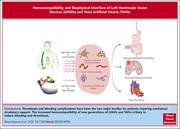
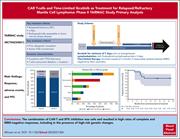
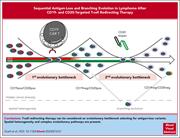
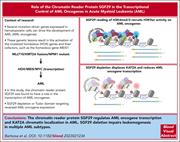
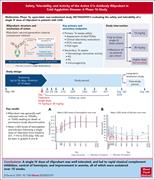
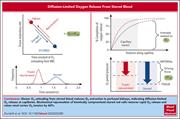

Does BTKi improve CAR T-cell therapy in MCL?
Clinical Trials & Observations